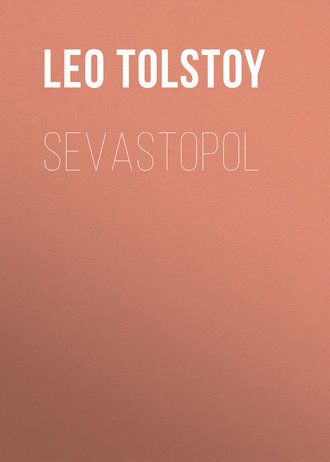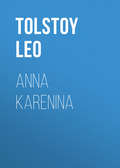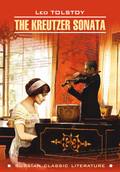
Лев Толстой
Sevastopol
X
As they entered the first room, surrounded with cots on which lay the wounded, and permeated with that frightful and disgusting hospital odor, they met two Sisters of Mercy, who were coming to meet them.
One woman, of fifty, with black eyes, and a stern expression of countenance, was carrying bandages and lint, and was giving strict orders to a young fellow, an assistant surgeon, who was following her; the other, a very pretty girl of twenty, with a pale and delicate little fair face, gazed in an amiably helpless way from beneath her white cap, held her hands in the pockets of her apron, as she walked beside the elder woman, and seemed to be afraid to quit her side.
Kozeltzoff addressed to them the question whether they knew where Martzoff was – the man whose leg had been torn off on the day before.
“He belonged to the P – regiment, did he not?” inquired the elder. “Is he a relative of yours?”
“No, a comrade.”
“Show them the way,” said she, in French, to the young sister. “Here, this way,” and she approached a wounded man, in company with the assistant.
“Come along; what are you staring at?” said Kozeltzoff to Volodya, who, with uplifted eyebrows and somewhat suffering expression of countenance, could not tear himself away, but continued to stare at the wounded. “Come, let us go.”
Volodya went off with his brother, still continuing to gaze about him, however, and repeating unconsciously: —
“Ah, my God! Ah, my God!”
“He has probably not been here long?” inquired the sister of Kozeltzoff, pointing at Volodya, who, groaning and sighing, followed them through the corridor.
“He has but just arrived.”
The pretty little sister glanced at Volodya, and suddenly burst out crying. “My God! my God! when will there be an end to all this?” she said, with the accents of despair. They entered the officer's hut. Martzoff was lying on his back, with his muscular arms, bare to the elbow, thrown over his head, and with the expression on his yellow face of a man who is clenching his teeth in order to keep from shrieking with pain. His whole leg, in its stocking, was thrust outside the coverlet, and it could be seen how he was twitching his toes convulsively inside it.
“Well, how goes it, how do you feel?” asked the sister, raising his bald head with her slender, delicate fingers, on one of which Volodya noticed a gold ring, and arranging his pillow. “Here are some of your comrades come to inquire after you.”
“Badly, of course,” he answered, angrily. “Let me alone! it's all right,” – the toes in his stocking moved more rapidly than ever. “How do you do? What is your name? Excuse me,” he said, turning to Kozeltzoff… “Ah, yes, I beg your pardon! one forgets everything here,” he said, when the latter had mentioned his name. “You and I lived together,” he added, without the slightest expression of pleasure, glancing interrogatively at Volodya.
“This is my brother, who has just arrived from Petersburg to-day.”
“Hm! Here I have finished my service,” he said, with a frown. “Ah, how painful it is!.. The best thing would be a speedy end.”
He drew up his leg, and covered his face with his hands, continuing to move his toes with redoubled swiftness.
“You must leave him,” said the sister, in a whisper, while the tears stood in her eyes; “he is in a very bad state.”
The brothers had already decided on the north side to go to the fifth bastion; but, on emerging from the Nikolaevsky battery, they seemed to have come to a tacit understanding not to subject themselves to unnecessary danger, and, without discussing the subject, they determined to go their ways separately.
“Only, how are you to find your way, Volodya?” said the elder. “However, Nikolaeff will conduct you to the Korabelnaya, and I will go my way alone, and will be with you to-morrow.”
Nothing more was said at this last leave-taking between the brothers.
XI
The thunder of the cannon continued with the same power as before, but Yekaterinskaya street, along which Volodya walked, followed by the taciturn Nikolaeff, was quiet and deserted. All that he could see, through the thick darkness, was the wide street with the white walls of large houses, battered in many places, and the stone sidewalk beneath his feet; now and then, he met soldiers and officers. As he passed along the left side of the street, near the Admiralty building, he perceived, by the light of a bright fire burning behind the wall, the acacias planted along the sidewalk, with green guards beneath, and the wretchedly dusty leaves of these acacias.
He could plainly hear his own steps and those of Nikolaeff, who followed him, breathing heavily. He thought of nothing; the pretty little Sister of Mercy, Martzoff's leg with the toes twitching in its stocking, the bombs, the darkness, and divers pictures of death floated hazily through his mind. All his young and sensitive soul shrank together, and was borne down by his consciousness of loneliness, and the indifference of every one to his fate in the midst of danger.
“They will kill me, I shall be tortured, I shall suffer, and no one will weep.” And all this, instead of the hero's life, filled with energy and sympathy, of which he had cherished such glorious dreams. The bombs burst and shrieked nearer and ever nearer. Nikolaeff sighed more frequently, without breaking the silence. On crossing the bridge leading to the Korabelnaya, he saw something fly screaming into the bay, not far from him, which lighted up the lilac waves for an instant with a crimson glow, then disappeared, and threw on high a cloud of foam.
“See there, it was not put out!” said Nikolaeff, hoarsely.
“Yes,” answered Volodya, involuntarily, and quite unexpectedly to himself, in a thin, piping voice.
They encountered litters with wounded men, then more regimental transports with gabions; they met a regiment on Korabelnaya street; men on horseback passed them. One of them was an officer, with his Cossack. He was riding at a trot, but, on catching sight of Volodya, he reined in his horse near him, looked into his face, turned and rode on, giving the horse a blow of his whip.
“Alone, alone; it is nothing to any one whether I am in existence or not,” thought the lad, and he felt seriously inclined to cry.
After ascending the hill, past a high white wall, he entered a street of small ruined houses, incessantly illuminated by bombs. A drunken and dishevelled woman, who was coming out of a small door in company with a sailor, ran against him.
“If he were only a fine man,” she grumbled, – “Pardon, Your Honor the officer.”
The poor boy's heart sank lower and lower, and more and more frequently flashed the lightnings against the dark horizon, and the bombs screamed and burst about him with ever increasing frequency. Nikolaeff sighed, and all at once he began to speak, in what seemed to Volodya a frightened and constrained tone.
“What haste we made to get here from home. It was nothing but travelling. A pretty place to be in a hurry to get to!”
“What was to be done, if my brother was well again,” replied Volodya, in hope that he might banish by conversation the frightful feeling that was taking possession of him.
“Well, what sort of health is it when he is thoroughly ill! Those who are really well had better stay in the hospital at such a time. A vast deal of joy there is about it, isn't there? You will have a leg or an arm torn off, and that's all you will get! It's not far removed from a downright sin! And here in the town it's not at all like the bastion, and that is a perfect terror. You go and you say your prayers the whole way. Eh, you beast, there you go whizzing past!” he added, directing his attention to the sound of a splinter of shell whizzing by near them. “Now, here,” Nikolaeff went on, “I was ordered to show Your Honor the way. My business, of course, is to do as I am bid; but the cart has been abandoned to some wretch of a soldier, and the bundle is undone… Go on and on; but if any of the property disappears, Nikolaeff will have to answer for it.”
After proceeding a few steps further, they came out on a square. Nikolaeff held his peace, but sighed.
“Yonder is your artillery, Your Honor!” he suddenly said. “Ask the sentinel; he will show you.”
And Volodya, after he had taken a few steps more, ceased to hear the sound of Nikolaeff's sighs behind him.
All at once, he felt himself entirely and finally alone. This consciousness of solitude in danger, before death, as it seemed to him, lay upon his heart like a terribly cold and heavy stone.
He halted in the middle of the square, glanced about him, to see whether he could catch sight of any one, grasped his head, and uttered his thought aloud in his terror: – “Lord! Can it be that I am a coward, a vile, disgusting, worthless coward … can it be that I so lately dreamed of dying with joy for my father-land, my tsar? No, I am a wretched, an unfortunate, a wretched being!” And Volodya, with a genuine sentiment of despair and disenchantment with himself, inquired of the sentinel for the house of the commander of the battery, and set out in the direction indicated.
XII
The residence of the commander of the battery, which the sentinel had pointed out to him, was a small, two-story house, with an entrance on the court-yard. In one of the windows, which was pasted over with paper, burned the feeble flame of a candle. A servant was seated on the porch, smoking his pipe; he went in and announced Volodya to the commander, and then led him in. In the room, between the two windows, and beneath a shattered mirror, stood a table, heaped with official documents, several chairs, and an iron bedstead, with a clean pallet, and a small bed-rug by its side.
Near the door stood a handsome man, with a large moustache, – a sergeant, in sabre and cloak, on the latter of which hung a cross and a Hungarian medal. Back and forth in the middle of the room paced a short staff-officer of forty, with swollen cheeks bound up, and dressed in a thin old coat.
“I have the honor to report myself, Cornet Kozeltzoff, 2d, ordered to the fifth light battery,” said Volodya, uttering the phrase which he had learned by heart, as he entered the room.
The commander of the battery responded dryly to his greeting, and, without offering his hand, invited him to be seated.
Volodya dropped timidly into a chair, beside the writing-table, and began to twist in his fingers the scissors, which his hand happened to light upon. The commander of the battery put his hands behind his back, and, dropping his head, pursued his walk up and down the room, in silence, only bestowing an occasional glance at the hands which were twirling the scissors, with the aspect of a man who is trying to recall something.
The battery commander was a rather stout man, with a large bald spot on the crown of his head, a thick moustache, which drooped straight down and concealed his mouth, and pleasant brown eyes. His hands were handsome, clean, and plump; his feet small and well turned, and they stepped out in a confident and rather dandified manner, proving that the commander was not a timid man.
“Yes,” he said, coming to a halt in front of the sergeant; “a measure must be added to the grain to-morrow, or our horses will be getting thin. What do you think?”
“Of course, it is possible to do so, Your Excellency! Oats are very cheap just now,” replied the sergeant, twitching his fingers, which he held on the seams of his trousers, but which evidently liked to assist in the conversation. “Our forage-master, Franchuk, sent me a note yesterday, from the transports, Your Excellency, saying that we should certainly be obliged to purchase oats; they say they are cheap. Therefore, what are your orders?”
“To buy, of course. He has money, surely.” And the commander resumed his tramp through the room. “And where are your things?” he suddenly inquired of Volodya, as he paused in front of him.
Poor Volodya was so overwhelmed by the thought that he was a coward, that he espied scorn for himself in every glance, in every word, as though they had been addressed to a pitiable poltroon. It seemed to him that the commander of the battery had already divined his secret, and was making sport of him. He answered, with embarrassment, that his effects were on the Grafskaya, and that his brother had promised to send them to him on the morrow.
But the lieutenant-colonel was not listening to him, and, turning to the sergeant, he inquired: —
“Where are we to put the ensign?”
“The ensign, sir?” said the sergeant, throwing Volodya into still greater confusion by the fleeting glance which he cast upon him, and which seemed to say, “What sort of an ensign is this?” – “He can be quartered downstairs, with the staff-captain, Your Excellency,” he continued, after a little reflection. “The captain is at the bastion just now, and his cot is empty.”
“Will that not suit you, temporarily?” said the commander. – “I think you must be tired, but we will lodge you better to-morrow.”
Volodya rose and bowed.
“Will you not have some tea?” said the commander, when he had already reached the door. “The samovár can be brought in.”
Volodya saluted and left the room. The lieutenant-colonel's servant conducted him downstairs, and led him into a bare, dirty chamber, in which various sorts of rubbish were lying about, and where there was an iron bedstead without either sheets or coverlet. A man in a red shirt was fast asleep on the bed, covered over with a thick cloak.
Volodya took him for a soldier.
“Piotr Nikolaïtch!” said the servant, touching the sleeper on the shoulder. “The ensign is to sleep here… This is our yunker,” he added, turning to the ensign.
“Ah, don't trouble him, please,” said Volodya; but the yunker, a tall, stout, young man, with a handsome but very stupid face, rose from the bed, threw on his cloak, and, evidently not having had a good sleep, left the room.
“No matter; I'll lie down in the yard,” he growled out.
XIII
Left alone with his own thoughts, Volodya's first sensation was a fear of the incoherent, forlorn state of his own soul. He wanted to go to sleep, and forget all his surroundings, and himself most of all. He extinguished the candle, lay down on the bed, and, taking off his coat, he wrapped his head up in it, in order to relieve his terror of the darkness, with which he had been afflicted since his childhood. But all at once the thought occurred to him that a bomb might come and crush in the roof and kill him. He began to listen attentively; directly overhead, he heard the footsteps of the battery commander.
“Anyway, if it does come,” he thought, “it will kill any one who is upstairs first, and then me; at all events, I shall not be the only one.”
This thought calmed him somewhat.
“Well, and what if Sevastopol should be taken unexpectedly, in the night, and the French make their way hither? What am I to defend myself with?”
He rose once more, and began to pace the room. His terror of the actual danger outweighed his secret fear of the darkness. There was nothing heavy in the room except the samovár and a saddle. “I am a scoundrel, a coward, a miserable coward!” the thought suddenly occurred to him, and again he experienced that oppressive sensation of scorn and disgust, even for himself. Again he threw himself on the bed, and tried not to think.
Then the impressions of the day involuntarily penetrated his imagination, in consequence of the unceasing sounds, which made the glass in the solitary window rattle, and again the thought of danger recurred to him: now he saw visions of wounded men and blood, now of bombs and splinters, flying into the room, then of the pretty little Sister of Mercy, who was applying a bandage to him, a dying man, and weeping over him, then of his mother, accompanying him to the provincial town, and praying, amid burning tears, before the wonder-working images, and once more sleep appeared an impossibility to him.
But suddenly the thought of Almighty God, who can do all things, and who hears every supplication, came clearly into his mind. He knelt down, crossed himself, and folded his hands as he had been taught to do in his childhood, when he prayed. This gesture, all at once, brought back to him a consoling feeling, which he had long since forgotten.
“If I must die, if I must cease to exist, ‘thy will be done, Lord,’” he thought; “let it be quickly; but if bravery is needed, and the firmness which I do not possess, give them to me; deliver me from shame and disgrace, which I cannot bear, but teach me what to do in order to fulfil thy will.”
His childish, frightened, narrow soul was suddenly encouraged; it cleared up, and caught sight of broad, brilliant, and new horizons. During the brief period while this feeling lasted, he felt and thought many other things, and soon fell asleep quietly and unconcernedly, to the continuous sounds of the roar of the bombardment and the rattling of the window-panes.
Great Lord! thou alone hast heard, and thou alone knowest those ardent, despairing prayers of ignorance, of troubled repentance, those petitions for the healing of the body and the enlightenment of the mind, which have ascended to thee from that terrible precinct of death, from the general who, a moment before, was thinking of his cross of the George on his neck, and conscious in his terror of thy near presence, to the simple soldier writhing on the bare earth of the Nikolaevsky battery, and beseeching thee to bestow upon him there the reward, unconsciously presaged, for all his sufferings.
XIV
The elder Kozeltzoff, meeting on the street a soldier belonging to his regiment, betook himself at once, in company with the man, to the fifth bastion.
“Keep under the wall, Your Honor,” said the soldier.
“What for?”
“It's dangerous, Your Honor; there's one passing over,” said the soldier, listening to the sound of a screaming cannon-ball, which struck the dry road, on the other side of the street.
Kozeltzoff, paying no heed to the soldier, walked bravely along the middle of the street.
These were the same streets, the same fires, even more frequent now, the sounds, the groans, the encounters with the wounded, and the same batteries, breastworks, and trenches, which had been there in the spring, when he was last in Sevastopol; but, for some reason, all this was now more melancholy, and, at the same time, more energetic, the apertures in the houses were larger, there were no longer any lights in the windows, with the exception of the Kushtchin house (the hospital), not a woman was to be met with, the earlier tone of custom and freedom from care no longer rested over all, but, instead, a certain impress of heavy expectation, of weariness and earnestness.
But here is the last trench already, and here is the voice of a soldier of the P – regiment, who has recognized the former commander of his company, and here stands the third battalion in the gloom, clinging close to the wall, and lighted up now and then, for a moment, by the discharges, and a sound of subdued conversation, and the rattling of guns.
“Where is the commander of the regiment?” inquired Kozeltzoff.
“In the bomb-proofs with the sailors, Your Honor,” replied the soldier, ready to be of service. “I will show you the way, if you like.”
From trench to trench the soldier led Kozeltzoff, to the small ditch in the trench. In the ditch sat a sailor, smoking his pipe; behind him a door was visible, through whose cracks shone a light.
“Can I enter?”
“I will announce you at once,” and the sailor went in through the door.
Two voices became audible on the other side of the door.
“If Prussia continues to observe neutrality,” said one voice, “then Austria also…”
“What difference does Austria make,” said the second, “when the Slavic lands … well, ask him to come in.”
Kozeltzoff had never been in this casemate. He was struck by its elegance. The floor was of polished wood, screens shielded the door. Two bedsteads stood against the wall, in one corner stood a large ikon of the mother of God, in a gilt frame, and before her burned a rose-colored lamp.
On one of the beds, a naval officer, fully dressed, was sleeping. On the other, by a table upon which stood two bottles of wine, partly empty, sat the men who were talking – the new regimental commander and his adjutant.
Although Kozeltzoff was far from being a coward, and was certainly not guilty of any wrongdoing so far as his superior officers were concerned, nor towards the regimental commander, yet he felt timid before the colonel, who had been his comrade not long before, so proudly did this colonel rise and listen to him.
“It is strange,” thought Kozeltzoff, as he surveyed his commander, “it is only seven weeks since he took the regiment, and how visible already is his power as regimental commander, in everything about him – in his dress, his bearing, his look. Is it so very long,” thought he, “since this Batrishtcheff used to carouse with us, and he wore a cheap cotton shirt, and ate by himself, never inviting any one to his quarters, his eternal meat-balls and curd-patties? But now! and that expression of cold pride in his eyes, which says to you, ‘Though I am your comrade, because I am a regimental commander of the new school, yet, believe me, I am well aware that you would give half your life merely for the sake of being in my place!’”
“You have been a long time in recovering,” said the colonel to Kozeltzoff, coldly, with a stare.
“I was ill, colonel! The wound has not closed well even now.”
“Then there was no use in your coming,” said the colonel, casting an incredulous glance at the captain's stout figure. “You are, nevertheless, in a condition to fulfil your duty?”
“Certainly I am, sir.”
“Well I'm very glad of that, sir. You will take the ninth company from Ensign Zaitzoff – the one you had before; you will receive your orders immediately.”
“I obey, sir.”
“Take care to send me the regimental adjutant when you arrive,” said the regimental commander, giving him to understand, by a slight nod, that his audience was at an end.
On emerging from the casemate, Kozeltzoff muttered something several times, and shrugged his shoulders, as though pained, embarrassed, or vexed at something, and vexed, not at the regimental commander (there was no cause for that), but at himself, and he appeared to be dissatisfied with himself and with everything about him.






